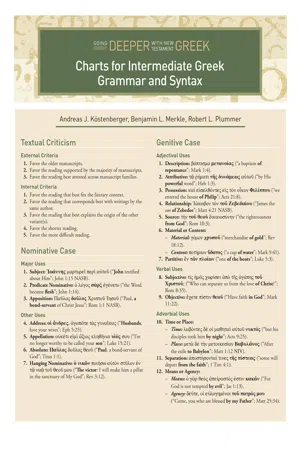
Charts for Intermediate Greek Grammar and Syntax
A Quick Reference Guide to Going Deeper with New Testament Greek
- 6 pages
- English
- ePUB (mobile friendly)
- Available on iOS & Android
Charts for Intermediate Greek Grammar and Syntax
A Quick Reference Guide to Going Deeper with New Testament Greek
About this book
The premier "cheat sheet" for Greek Syntax and Exegesis. Keyed to the best-selling Going Deeper with New Testament Greek (by Kostenberger, Merkle, and Plummer), this set of folding laminated pages covers all traditional syntactical categories (for example, uses of the genitive, rules about the Greek article, possible translations of the imperfect tense), as well as information about New Testament textual criticism, current summaries on Verbal Aspect debates, and steps on doing Greek word studies. Each syntactical category includes an example from the Greek New Testament (with Greek text quoted) and an accompanying English translation.The specific word or phrase in question is in bold font in both the Greek and English text. With these laminated sheets by your side, you will never waste time flipping through your intermediate grammar looking for that syntactical term or grammatical function you can't quite remember.
Frequently asked questions
- Essential is ideal for learners and professionals who enjoy exploring a wide range of subjects. Access the Essential Library with 800,000+ trusted titles and best-sellers across business, personal growth, and the humanities. Includes unlimited reading time and Standard Read Aloud voice.
- Complete: Perfect for advanced learners and researchers needing full, unrestricted access. Unlock 1.4M+ books across hundreds of subjects, including academic and specialized titles. The Complete Plan also includes advanced features like Premium Read Aloud and Research Assistant.
Please note we cannot support devices running on iOS 13 and Android 7 or earlier. Learn more about using the app.
Information
- Favor the older manuscripts.
- Favor the reading supported by the majority of manuscripts.
- Favor the reading best attested across manuscript families.
- Favor the reading that best fits the literary context.
- Favor the reading that corresponds best with writings by the same author.
- Favor the reading that best explains the origin of the other variant(s).
- Favor the shorter reading.
- Favor the more difficult reading.
- Subject: Ἰωάννης μαρτυρεῖ περὶ αὐτοῦ (“John testified about Him”; John 1:15 NASB).
- Predicate Nominative: ὁ λόγος σὰρξ ἐγένετο (“the Word became flesh”; John 1:14).
- Apposition: Παῦλος δοῦλος Χριστοῦ Ἰησοῦ (“Paul, a bond-servant of Christ Jesus”; Rom 1:1 NASB).
- Address: οἱ ἄνδρες, ἀγαπᾶτε τὰς γυναῖκας (“Husbands, love your wives”; Eph 5:25).
- Appellation: οὐκέτι εἰμὶ ἄξιος κληθῆναι υἱός σου (“I’m no longer worthy to be called your son”; Luke 15:21).
- Absolute: Παῦλος δοῦλος θεοῦ (“Paul, a bond-servant of God”; Titus 1:1).
- Hanging Nominative: ὁ νικῶν ποιήσω αὐτὸν στῦλον ἐν τῷ ναῷ τοῦ θεοῦ μου (“The victor: I will make him a pillar in the sanctuary of My God”; Rev 3:12).
- Description: βάπτισμα μετανοίας (“a baptism of repentance”; Mark 1:4).
- Attributive: τῷ ῥήματι τῆς δυνάμεως αὐτοῦ (“by His powerful word”; Heb 1:3).
- Possession: καὶ εἰσελθόντες εἰς τὸν οἶκον Φιλίππου (“we entered the house of Philip”; Acts 21:8).
- Relationship: Ἰάκωβον τὸν τοῦ Ζε...
Table of contents
- Page 1